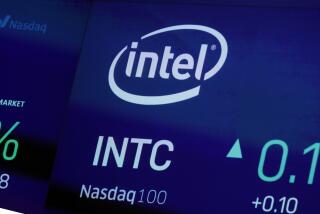Intel Accepts Japan Fair-Trade Order
Accepting the punishment recommended by Japan’s fair trade agency, Intel Corp. said Thursday that it would change some of its business practices that critics contended gave the chip maker an unfair advantage in the personal computer market.
But the world’s largest semiconductor company said it still disagreed with the accusations and questioned how Japan’s Fair Trade Commission was applying the law.
Intel’s response came nearly a month after the agency ruled that the company violated Japan’s anti-monopoly laws by offering discounts in exchange for exclusive or near-exclusive deals with Japanese computer makers. The investigation was triggered by the complaints of rivals.
Santa Clara, Calif.-based Intel denied the allegations but decided the changes outlined in the agency’s proposed cease-and-desist order would not affect its ability to compete in the Japanese marketplace, spokesman Chuck Mulloy said.
“We can still compete,” he said. “We won’t go through the long administrative and legal process, nor will we put our customers through that.”
The Fair Trade Commission and Intel will work together to determine the next steps to be taken, said agency official Masaru Matsuo. “We will continue to monitor to make sure Intel is following the order appropriately,” Matsuo said.
The agency said computer makers Hitachi Ltd., Sony Corp., Fujitsu Ltd., Toshiba Corp. and NEC Corp. were offered discounts on the condition that they either use Intel processors exclusively or limit the use of competitors’ chips to 10%.
Regulators claimed that Intel broke antitrust laws as early as 2002. Intel’s market share in Japan jumped from 78% that year to 90% in 2004, according to research firm IDC. Rival Advanced Micro Devices Inc.’s share dropped from 18% to 8%.
Under the order, Intel can no longer require customers -- nor can customers commit -- to use the company’s chips exclusively or nearly exclusively across product cycles, which typically span three or four months. Intel must now submit a bid for each cycle, even if a customer wants a deal to run longer, Mulloy said.
The other aspect of the order bars Intel from contractually requiring a customer to use Intel chips 100% of the time, although the PC makers can continue to do so if they choose.
Intel also is subject to a fine that Mulloy characterized as a “few thousand dollars.”
Provided those requirements are met, Intel can continue to offer discounts.
Mulloy also said Intel did not pay computer makers to stop buying AMD chips. Rather, Intel’s discounts simply matched those offered by its rival.
Intel also maintains that the agency’s actions are out of step with the rest of the world.
“At the end of the day, consumers benefit with lower prices,” Mulloy said. “That’s the economic view of it as opposed to a view that says a competitor may have been harmed.”






